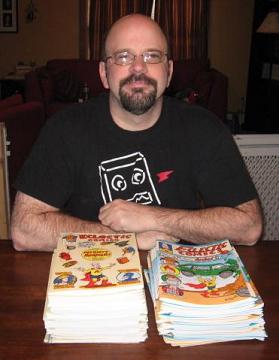Andrew Wales is the creator of T.A.I.L.S. (Traveling Adventurers in Laboratory Science) for Boy’s Quest magazine, and a similar comic for their sister publication Hopscotch. In addition he’s also creates comics and illustrations for Fun for Kids magazine. He’s currently working on his self-published comic book, Eclectic Comics.
He lives in Athens, Pennsylvania, and teaches art to elementary kids by day. You can find out more about Andrew on his blog.
Question 1: When did you first decide that you wanted to create your own comics for a living?
Can we make comics and even make a little money at it without quitting our day job? I’d like to think that my story suggests that it’s possible! I am an elementary art teacher, which is a very rewarding career. I think that in making comics I’m being an example to my students. I encourage every one of them to find something creative that they really enjoy and I hope that they will always make time in their lives for creativity. Making comics is the thing that I do for myself. I make a little bit of money from freelance jobs, which finance the self-publishing ventures I want to do.
Question 2: Who has had the biggest influence on you outside the comics industry, and how did they affect your life?
There have been many, but one book I read was called Creating a Life Worth Living. This book encouraged me to be diligent to always make room in my life for creative pursuits. These creative productions will have immense value, whether they are shared with a few friends — or become blockbusters.
Question 3: Who has had the biggest influence on your comics career, and how has that person changed your work?
Sergio Aragones, Stan Sakai, and Jack Kirby. I cut my teeth on Aragones as a kid. Sakai has been a real encouragement and an online mentor through his website and forum. His Art of Usagi Yojimbo is a helpful resource that shows the steps in making a comic. Kirby has always been a constant source of fascination — his innovations, his wild imagination, his dynamic art.

Reading and sketching. I like to read and look at comics of the Silver Age. I like that simplicity, goofiness and the iconic nature of it. I like to use writing prompts and sketch games, like the one at the Gurney Journey.
When I feel like I have a really good idea, it’s hard to keep me away from the drawing board.
Question 5: Describe your typical work routine.
During the school year, it’s difficult to find time to work, but I do find some time on evenings and weekends. During the summer, it’s easier, and I almost accomplish the “page-a-day†goal. I first start with the idea. Then I make very rough thumbnail sketches. The writing is done during this stage. Then I sketch them out on comic boards. I do pretty tight pencils of the foregrounds, and then ink. The erasing is my least favorite part! Then I add background details, and a little texture with Micron markers. Then come the scanning and computer work, which is also not an aspect that is enjoyable.
Question 6: What writing, drawing, or other tools do you use?
I do the thumbnails in my sketchbook with a fine point gel pen. I draw on Canson comic book art boards with pencil and ink with Speedball C-6 pen and crow quill pens. Then I finish up with the Micron markers.

Seeing it in print – holding in my hands that final product. Getting feedback from readers is also great.
Question 8: What has been the most rewarding project in your professional career – in or out of comics – and why?
Most of my work has been work-for-hire that I’ve been pleased with to varying degrees, but what I have really found rewarding is making Eclectic Comics. For this project, I give myself permission to do anything at all within the comics art form. So far I’ve done autobio, superhero slapstick, biography — but you never know what you might find when you pick this up.
Question 9: We’ve all met very talented newcomers who are trying to get their first professional projects. What’s the best advice you’ve ever heard given to a promising new creator?
I’ll try to paraphrase what I heard from many sources: If you want to make comics, make them. Just get going. Your first several pages are not going to be that great, but don’t be discouraged. Get those bad pages out of the way and keep going. Find the style that is most comfortable for you. If you make something that you enjoy and ten other readers love — would it be worth it to you? I think it would. If it snowballs into something beyond that, so be it!
Question 10: Time to get philosophical: What’s the most important “big idea” that you’ve learned in life – in or out of comics – and why is it important?
I think every person is an original work of art from The Greatest Artist ever. I think each of us should be ourselves and not try to be like someone else. Here’s a quote from The Message Bible: “I know what I’m doing. I have it all planned out — plans to take care of you, not abandon you, plans to give you the future you hope for.†[Jeremiah 29:11]

